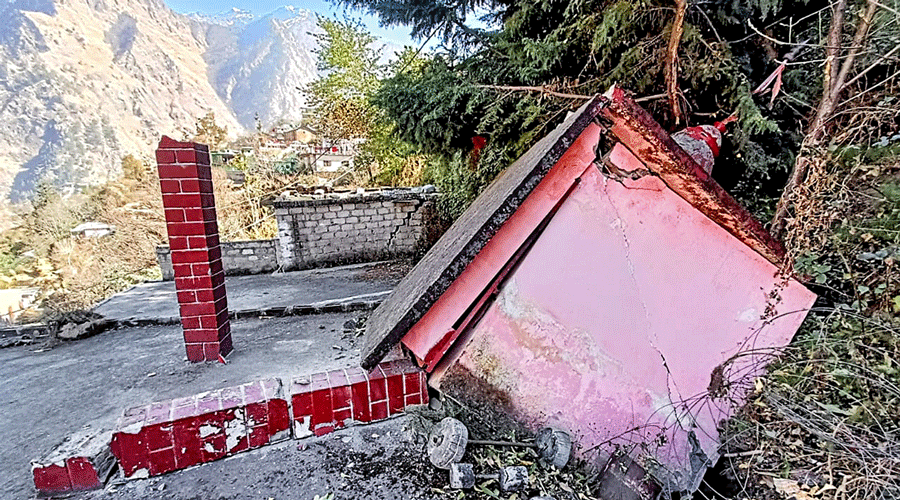The Shankaracharya of Jyotirmath (Joshimath), where cracks have appeared in roads and hundreds of buildings, has petitioned the Supreme Court to “protect the ancient religious city” while expressing a lack of confidence in the BJP government.
The development coincides with a door-to-door campaign by the Chamoli district administration to persuade affected families to move to relief centres, with over 60 families already shifted and another 90 to be evacuated soon, PTI reported.
“There are BJP governments at the Centre and in Uttarakhand but neither is bothered about the city and its people,” Swami Avimukteshwaranand, who filed the public interest plea last week, told reporters at his ashram in Jyotirmath on Sunday.
“They don’t even know the reasons behind the cracks in the walls, collapsing buildings, sinking roads and water seepage at several places in a city spread over barely 4-5km. I approached the Supreme Court because the governments don’t know what they should do.”
He blamed successive governments for the disaster, a result of rampant construction in the ecologically sensitive hill state.
“Some experts have been warning the governments for many years but they took it lightly and continued heavy construction, including tunnels and hydropower projects. How can we expect the same government to look for a solution?” the Shankaracharya said.
“Joshimath is a small place with only about 25,000 families, of whom about 2,000 have already fled. The city will become empty soon.”
Chamoli district magistrate Himanshu Khurana has said that cracks have appeared in about 610 of the town’s 4,500 buildings, and roads have sunk in many places. Officials said fresh cracks developed on Sunday in two roads and 12 buildings, including the tehsil office of Joshimath. A floor of the office sank, forcing its closure.
“We have put separate officials in charge of every area of the city, assigning them to report any developments and keep a close watch. We are trying to take people to safer places,” Khurana said.
Durga Prasad Saklani, a resident, said the first cracks in the walls of his home appeared in 2021. “The administration has been sleeping since then, making it clear that they are not sensitive towards the safety of Joshimath,” Saklani said.
Dinesh Jain of Singhdhar, Joshimath, shifted to Dehradun with his family two days ago and is looking for a house to rent. “Nobody is able to say what will happen to our city,” he said.
Jyotirmath, founded in AD 820, is one of four seats of Shankaracharyas that Adi Shankara had established and is one of the most important centres of pilgrimage for Hindus. The other seats are the Sringeri Sarada Pitham in Karnataka, Dwaraka Sarada Peetham in Gujarat and Puri Govardhan Pitham in Odisha.
Brahmachari Mukundanand, who is in charge of the Jyotirmath ashram of Adi Shankara, said: “The centuries-old tradition of the Shankaracharyas is in danger but nobody in the government appears serious about taking corrective measures.”
Uttarakhand chief minister Pushkar Singh Dhami said: “We have prepared an initial report. Experts will soon draw up a detailed report so that we can take corrective measures. Prime Minister Narendra Modi too is concerned about the problem and we will together save Joshimath.”
Evacuation drive
Joshimath has been declared a landslide-subsidence zone and the administration has set up relief centres at four or five places, Garhwal commissioner Sushil Kumar said, according to PTI.
“The situation worsened apparently after a water channel beneath the town erupted last week,” he said.
DM Khurana on Sunday travelled door to door to assess the extent of damage and appealed to people living in houses with cracks to move to the temporary relief centres. He said the affected area forms an arc that may extend up to 1.5km.
Apart from the relief centres set up at four or five safe places in Joshimath, several buildings — including a few hotels, a gurdwara and two inter-colleges — have been acquired to serve as makeshift shelters that can accommodate around 1,500 people, he said.
The state government will pay Rs 4,000 a month for up to six months to those who want to move to rented accommodation, Khurana said, asking people not to risk their lives by choosing to continue living in damaged houses.
The National Remote Sensing Centre, Hyderabad, and the Indian Institute of Remote Sensing, Dehradun, have been asked to conduct a study of Joshimath through satellite imagery and submit a detailed report with photographs.
The Geological Survey of India has been asked to examine the suitability of Koti Farm, Herb Institute and the horticulture department’s land in Joshimath and in Pipalkoti’s Semaldala area for rehabilitation projects.











